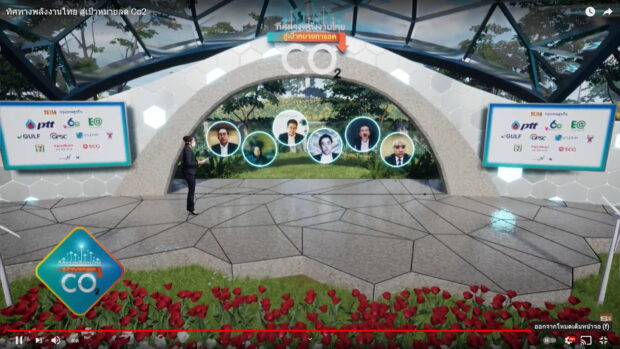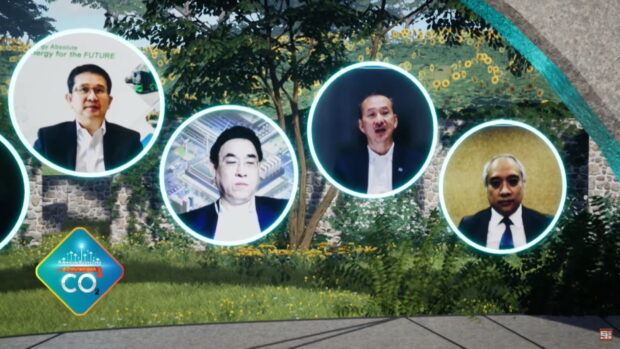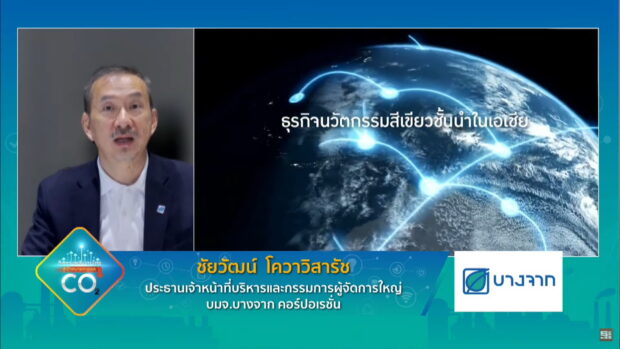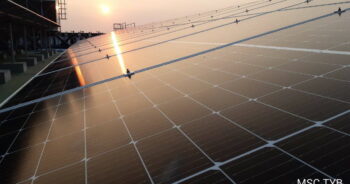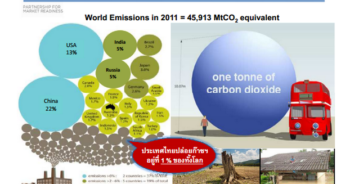ข่าวประชาสัมพันธ์
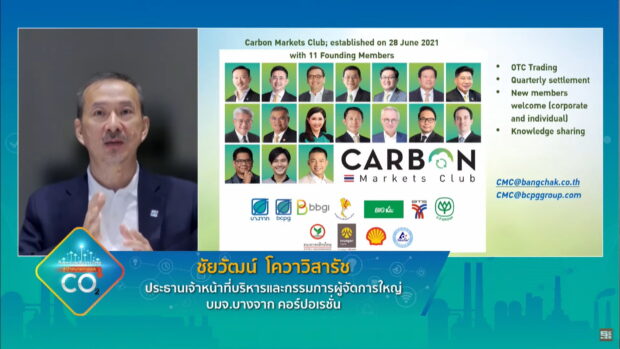
เมื่อวันที่ 27 สิงหาคมที่ผ่านมา นายชัยวัฒน์ โควาวิสารัช ประธานเจ้าหน้าที่บริหารและกรรมการผู้จัดการใหญ่ บริษัท บางจาก คอร์ปอเรชั่น จำกัด (มหาชน) ได้รับเชิญร่วมเสวนาหัวข้อ “ทิศทางพลังงานไทยสู่เป้าหมายการลด CO2 ” ในการสัมมนา “เป้าหมายลด CO2 กับทิศทางพลังงานไทย” จัดโดยหนังสือพิมพ์ฐานเศรษฐกิจ ผ่านระบบออนไลน์ โดยเปิดเผยว่ากลุ่มบางจากฯ ตั้งเป้าหมายการปล่อยก๊าซเรือนกระจกเป็นศูนย์ (Net Zero) ภายในปี 2050 และมีเป้าหมายแรกคือคาร์บอนเป็นศูนย์ (Carbon Neutral) ในปี 2030
ธุรกิจของกลุ่มบางจากฯ คิดเป็น 1% ของ GDP ของประเทศไทย แต่ปล่อยก๊าซเรือนกระจกเพียง 0.2%
นายชัยวัฒน์ได้กล่าวถึงทิศทางของอุตสาหกรรมน้ำมันของโลกว่าจะมีประมาณการจุดสูงสุดของความต้องการน้ำมันโลก (peak oil demand) ในเวลาอีกไม่กี่สิบปีข้างหน้า ดังนั้นองค์กรที่อยู่ในธุรกิจนี้จะต้องเผชิญกับการเปลี่ยนแปลงทางโครงสร้างแน่นอน
สำหรับภาพรวมของโลกในการปล่อยก๊าซเรือนกระจก (GHG) นั้น อยู่ที่มากกว่า 45,000 ล้านตันต่อปี ในขณะที่ประเทศไทยปล่อยที่ประมาณ 0.9-1.0% ของโลก (ประมาณ 400 ล้านตัน/ปี) ซึ่งเมื่อพิจารณาว่า GDP ของไทยคิดเป็น 0.5% ของ GDP โลก แสดงว่าประเทศไทยมีการปล่อยเกินไปเป็นเท่าตัว ดังนั้นไทยควรเร่งและกระตุ้นการลดการปล่อย GHG ในส่วนของธุรกิจของกลุ่มบางจากฯ คิดเป็นประมาณ 1% ของ GDP ของประเทศไทย ขณะที่ปล่อย GHG ประมาณ 0.2% ของปริมาณที่ประเทศไทยปล่อยเท่านั้น
ปรับปรุงประสิทธิภาพการใช้พลังงานและลงทุนในธุรกิจสีเขียวและการซื้อขายคาร์บอนเครดิต
กลุ่มบางจากฯ ได้ตั้งเป้าหมายการปล่อยก๊าซเรือนกระจกเป็นศูนย์ (Net Zero) ภายในปี 2050 โดยมีเป้าหมายสำคัญเป้าหมายแรกคือคาร์บอนเป็นศูนย์ (Carbon Neutral) ในปี 2030 ซึ่งขณะนี้การบริหารธุรกิจต่าง ๆ ได้มุ่งหน้าสู่เป้าหมายดังกล่าวอย่างต่อเนื่อง โดยแบ่งออกเป็น 2 ส่วนหลัก คือการปรับปรุงประสิทธิภาพต่าง ๆ ในกระบวนการผลิตและใช้ผลิตภัณฑ์ที่จะทำให้การปล่อย emission ลดลงได้ 20% ในปี 2024 และไปได้ถึง 30% ในปี 2030 ในขณะที่อีก 70% ต้องมีกลไกอื่นที่จะมาช่วย เช่นการลงทุนในธุรกิจพลังงานสีเขียวและการซื้อขายคาร์บอนเครดิต
ธุรกิจเติบโตแต่การปล่อยคาร์บอนลดลง ด้วยการเพิ่มสัดส่วนของธุรกิจสีเขียว
ในช่วงเริ่มต้น ธุรกิจหลักๆ ของกลุ่มบางจากฯ คือโรงกลั่นและสถานีบริการน้ำมัน และได้ปรับเปลี่ยนเพิ่มสัดส่วนธุรกิจอื่น ๆ โดยเฉพาะธุรกิจสีเขียว ได้แก่ โรงไฟฟ้าสีเขียว ธุรกิจชีวภาพ ธุรกิจทรัพยากรธรรมชาติต้นน้ำ ซึ่งระหว่างปี 2014-2019 บางจากฯ มี EBITDA เพิ่มขึ้น 50% แต่ emission เพิ่มขึ้นไม่ถึง 20% เป็นผลจากการควบคุม emission ของกลุ่มบางจากฯ ส่วนในอีก 7-8 ปีข้างหน้า วางแผนขยายธุรกิจโดยจะมี EBITDA เพิ่มขึ้น 2-3 เท่า แต่ให้มีการทยอยการลดการปล่อย CO2 จนเป็นศูนย์ในปี 2030 ซึ่งเป็นเป้าหมายที่สำคัญและท้าทาย
นวัตกรรมสีเขียวช่วยลดการปล่อย emission ในทุกธุรกิจ
ธุรกิจโรงกลั่นมีการปรับเป็น niche products refinery โดยในอนาคต 30% ของผลิตภัณฑ์ที่มาจากโรงกลั่น จะเป็นผลิตภัณฑ์ที่ไม่ใช่น้ำมัน เพื่อลดการปล่อย emission ใน scope 3 (การปล่อยจากผู้ที่นำผลิตภัณฑ์ไปใช้) ในขณะเดียวกันก็เพิ่มประสิทธิภาพของการใช้พลังงานและเพิ่มสัดส่วนพลังงานสะอาดเพื่อลดการปล่อยใน scope 1 (การปล่อยโดยตรงจากกระบวนการผลิต) และ 2 (การปล่อยทางอ้อมจากพลังงานที่ใช้ในการผลิต)
ในธุรกิจการตลาด สถานีบริการน้ำมัน greenovative destination มีการเพิ่มประสิทธิภาพ (efficiency improvement) ต่าง ๆ เช่น ติดตั้งหลังคาโซลาร์ นำน้ำจากหลังคามารดน้ำต้นไม้ และติดตั้ง EV Charger
ธุรกิจโรงงานไฟฟ้าพลังงานสีเขียว บีซีพีจีฯ เป็นบริษัทผลิตไฟฟ้าแห่งเดียวในประเทศไทยที่ทุกอิเล็กตรอนที่ผลิตออกมาเป็นอิเล็กตรอนสีเขียวคือมาจากพลังงานหมุนเวียนเท่านั้น และวันนี้กำลังเข้าสู่ธุรกิจการกักเก็บพลังงาน (Energy Storage)
ธุรกิจผลิตภัณฑ์ชีวภาพของบีบีจีไอฯ ใช้นวัตกรรม synthetic biology ผลิตผลิตภัณฑ์ต่าง ๆ จากพืชแทนสัตว์ เช่น เนื้อจากพืช เสื้อผ้า เครื่องสำอาง โดยไม่ต้องทำฟาร์มเลี้ยงสัตว์ซึ่งจะช่วยลดการปล่อย emission โดยเฉพาะก๊าซมีเทนได้ และกำลังก่อตั้ง Syn Bio Consortium ร่วมกับหลายภาคส่วนเพื่อสร้างเทคโนโลยีเพื่อต่อยอดธุรกิจ bio-based ต่าง ๆ
ธุรกิจใหม่ๆ มีการลงทุนในธุรกิจที่เป็น frontier ธุรกิจที่จะเปลี่ยนโลก ล่าสุดคือธุรกิจไฮโดรเจน
สนับสนุนการพัฒนาธุรกิจพลังงานสะอาดผ่าน Carbon Markets Club
บางจากฯ และพันธมิตรรวม 11 บริษัท ได้ร่วมกันตั้ง Carbon Markets Club สนับสนุนการพัฒนาธุรกิจพลังงานสะอาด กระตุ้นให้เกิดการซื้อขายคาร์บอนเครดิต ซึ่งจะช่วยทำให้มีการจัดสรรทรัพยากรโดยภาคเอกชนกันเอง โดยธุรกิจหรืออุตสาหกรรมที่ปล่อย emission มาก จะนำเงินส่วนหนึ่งมาซื้อคาร์บอนเครดิตเพื่อเป็นการชดเชย และนำเงินส่วนนั้นมาพัฒนาธุรกิจพลังงานสะอาดโดยไม่ต้องพึ่งเงินอุดหนุนจากภาครัฐ เป็นกลไกที่จะมาช่วยปิดช่องว่างในช่วง 5-10 ปีนี้ ในการเปลี่ยนผ่านด้านพลังงานจากพลังงานฟอสซิลสู่พลังงานสีเขียวหรือพลังงานสะอาด เพื่อให้ธุรกิจด้านพลังงานสะอาดสามารถพัฒนาได้
Carbon Markets Club วางแผนให้มีการซื้อขายกันทุก ๆ ไตรมาส และยินดีต้อนรับสมาชิกใหม่ทั้งประเภทองค์กรและประเภทบุคคล โดยสามารถติดต่อได้ที่ [email protected] หรือ [email protected]
Bangchak Group targets Net Zero by 2050
On 15 August 2021, Chaiwat Kovavisarach, President and Chief Executive Officer of Bangchak Corporation Public Company Limited was invited to join an online discussion on “Direction for Thailand in Reducing CO2 Emissions” part of the seminar “Targeting Reduced Co2 Emissions and Thai Energy” organized by Than Settakij, stating that Bangchak Group targets becoming Net Zero by 2050 and Carbon Neutrality by 2030.
Bangchak Group businesses account for 1% of Thai GDP but emits only 0.2% of Green House gases
Chaiwat stated that the global oil industry will reach peak oil demand in the upcoming decades, and as a result companies in the industry will have to undergo structural changes.
The world currently produces about 45,000 million tons of Green House Gases, while Thailand accounts for about 0.9-1.0% of emissions (about 400 million tons/year), which compared to the Thai GDP, which accounts for 0.5% of global GDP, Thailand emits more than double its emissions, therefore it is imperative that Thailand reduces its emissions. Bangchak Group businesses account for about 1% of the Thai GDP, and emits only about 0.2% of Thai emissions.
Improve Energy Efficiency and Invest in Green Businesses and Carbon Credit Trading
Bangchak Group targets Net Zero by 2050 and Carbon Neutrality by 2030. Presently its businesses are aiming to achieve this goal, which can be separated into two main parts, namely improving overall production efficiency and utilizing products that reduces emission by 20% by 2024, and 30% by 2030. The remaining 70% requires additional mechanism such as investments in green businesses and carbon credit trading.
Business Growth with Reduced Carbon Emissions through Green Businesses
Initially, main Bangchak Group businesses are refining and service stations, have the added new business, especially green businesses, namely green power plants, bio-based business, upstream natural resource business, which have between 2014-2019 increased Bangchak EBITDA by 50% but emission have increased by less than 20%, as a result of Bangchak Group emission controls. In the next 7-8 years, it plans to expand its business by 2-3 times but to slowly reduce CO2 emission to Carbon Neutrality by 2030, which is important and challenging.
Green Innovation Reduces Emission in all Businesses
The refinery businesses has been reconfigured to be a niche products refinery, where in the future 30% of products from the refinery will not be from petroleum to reduce emissions from scope 3 (emission from end users). Simultaneously, increase energy efficiency and increase the use of clear energy will reduce scope 1 emission (emissions from production) and 2 (emission from energy used in production)
The marketing business, Greenovative Destination service stations have overall efficiency improvements such as the installation of solar panel rooftops, utilizing grey water, and installing EV chargers.
Green power plants, BCPG is the only Thai energy provider that produces all its energy from green electrons, or renewable energy, and is entering into the Energy Storage business.
BBGI’s bio-based product business uses synthetic biology innovation to produce various products form plant by-products instead of animals such as meat from plants, clothing, cosmetics, without the need for animal farms helping to reduce emissions, especially methane, and is establishing the Syn Bio Consortium with many sectors to build new technologies that enhances bio-based businesses.
New businesses focuses on frontier businesses that can change the world, most recently with the hydrogen business.
Supporting the Clean Energy Development through the Carbon Markets Club
Bangchak and 11 partnering companies established the Carbon Markets Club to support the development of clean energy businesses, promoting carbon trading which will aid the private sector to manage resources, whereby businesses or industries that have high emissions, and can buy carbon credits to offset their emissions, and using the funds to develop clean energy businesses without depending on public funding. The mechanism will close the 5-10 year period of the Energy Transition from a fossil based energy to green energy or clean energy, and enable these clean energy businesses to develop.
The Carbon Markets Club plans to organize trading on a quarterly basis, and invites new members from the private sector and individuals. For more information contact [email protected] or [email protected]
